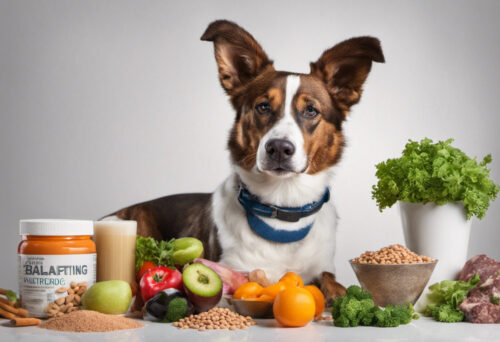Man’s best friend deserves the best from us, particularly when it comes to their nutrition. As responsible and loving dog owners, we need to ensure that our four-legged furry friends are served a balanced diet, packed with the right proportions of vitamins and minerals. These nutrients play a significant role in ensuring your pet’s optimum health and wellbeing. Let’s delve deeper into the role of vitamins and minerals in your dog’s diet and why they are nondisposable.
A Brief Introduction to Dog Nutrition
Before understanding the role of vitamins and minerals, it’s important to have a basic understanding of dog nutrition. Canines require a balanced diet, typically comprised of proteins, carbohydrates, fats, and, of course, vitamins and minerals. Dogs can extract the majority of these nutrients from a well-balanced commercial diet, but sometimes, supplementary vitamins and minerals are necessary. Consult with your vet to ensure that your dog’s diet is balanced and complete.
The Crux Point: Vitamins in Dog’s Diet
Vitamins are essential organic compounds that play a crucial role in bodily functions such as metabolism, immune response, and vision. They are broadly categorized into water-soluble and fat-soluble vitamins. Water-soluble vitamins include the B-complex group and Vitamin C, while fat-soluble ones are vitamins A, D, E, and K.
Certain studies, such as the one referenced here, have stressed the role of vitamins in a dog’s health. For instance, Vitamin A is essential for a dog’s vision, Vitamin D helps with calcium and phosphate regulation (thus aiding bone health), while Vitamin E works as an antioxidant protecting the body cells from peroxidative damage.
Digging Deep: The Importance of Minerals in a Dog’s Diet
Just as vitamins are indispensable, minerals in a dog’s diet are equally important. Minerals like calcium, phosphorus, sodium, and chloride should be a vital part of your dog’s daily intake for them to grow and thrive. Minerals contribute to building and maintaining a dog’s skeletal structure, water balance, nerve conduction, and many other biological processes.
This report by The National Academy of Sciences stresses how minerals are vital in regulating a multitude of body processes. The continuous intake of the right dose of minerals can make an appreciable difference in your pet’s state of health.
Ensuring that your dog’s food has enriched micronutrients is essential. Still, as owner, you need to exercise caution by not overloading them as it may lead to nutrient toxicity. Your pet’s breed, size, age, and overall health condition would all factor into his nutrient requirements. You’re now armed with the knowledge to provide the best care for your furry friend. Remember, before altering your dog’s diet or initiating any supplement regimen, consultation with the vet is always recommended.

Uncovering the Role of Specific Vitamins
The beauty of vitamins lies in their diversity and the role each plays. For example, Vitamin A, found in liver and fish oil, contributes greatly to canine vision, skin health, and overall growth. Conversely, B-complex Vitamins, such as B12 found in meats, dairy, and eggs, assist in creating energy from food intake, and boost canine longevity.
A Spotlight on Vitamin D
A standout among canine vitamins is undoubtedly Vitamin D. Playing a significant role in bone health through calcium and phosphate regulation, it is vital that dogs of all sizes, breeds, and ages receive an adequate amount. The Cornell University College of Veterinary Medicine provides further insights into the importance, and potential toxicity, of Vitamin D in a canine’s diet.
Minerals: An Essential Cornerstone
Minerals, though small, work wonders in your dog’s body. For instance, calcium, essential for strong bones and teeth, and phosphorus, instrumental for energy production, are fundamental. Similarly, potassium helps with nerve transmission and muscle contraction, making it crucial for active dogs. Further understanding of the role of these minerals can help you ensure your pet pal’s optimal health.
Dietary Considerations and Risks
Your dog’s food should abound with these essential minerals and vitamins. However, it’s worth noting that more doesn’t always mean better. Overloading your furry friend with unnecessary supplements can lead to toxicity and unbalance in natural processes. The American Society for the Prevention of Cruelty to Animals (ASPCA) offers comprehensive advice about potential toxicity risks.
Don’t Forget the Veterinarian
The age, breed, health status, and size of your pet play substantial roles in determining their nutritional needs. An expert opinion is invaluable in these matters. Always remember to consult with a local veterinarian before making any changes to your buddy’s diet or supplement intake.

Your Dog’s Diet: The Fine Balance
While it’s necessary to ensure your dog gets the necessary vitamins and minerals for optimum health, maintaining the right balance is equally important. Factors such as breed, size, age, and overall health status of your pet come into play when determining the right amount of these nutrients. Apart from their regular dog food, some dogs may require special diets or supplements. However, remember that excessive intake may be harmful and lead to nutrient toxicity.
Finding the Right Food for Your Furry Friend
Packaged dog food often contains the necessary vitamins and minerals for your pet. Additionally, certain brands have specialized food rich in specific nutrients. However, it’s always wise to read the labels and consult your vet before deciding on a diet or supplement route, ensuring you’re making the right choice for your pooch.
Vital Vitamins and Master Minerals: Making The Right Choice
When choosing the right nutritional plan for your dog, keep in mind that each vitamin and mineral has a specific role to play in your pet’s health. Fruits, vegetables, and animal products can be give in moderation as part of a balanced diet, provide additional natural sources of vitamins.
The Pet Nutritional Alliance provides helpful guidance on how to choose the right commercial dog food. It is worth noting that home-cooked without guidance from a knowledgeable source might miss essential nutrients.
The Doggy Diet Dilemma: Too Little or Too Much?
The ill effects of being deficient in any vitamins or minerals can be as severe as those associated with overconsumption. So, how can pet parents find the perfect balance? The key lies in tailoring your pet’s intake of these nutrients as per its specific needs, which, as aforementioned, relate to their breed, size, age, and health conditions. It is always advisable to seek the guidance of a veterinarian for the accurate dietary needs of your pet.
Keep Your Vet in the Loop
Lastly, no matter how seemingly minor a change you make to your dog’s diet, always keep your vet informed. A change of brand, introducing supplements, or even an increase in raw foods – these are all areas where your vet could offer valuable advice. This online directory will help you locate your nearest veterinarian.
Final Words on Vit & Min
Ensuring your dog gets the right vitamins and minerals in their diet is vital for their overall health and happiness. As an ardently caring and deeply loving pet parent, combine research and professional advice to cook up the perfectly balanced diet for your fur baby. Afterall, their wagging tail and sparkly eyes, brimming with vitality, make it all worth your effort. Here’s wishing you and your dog a healthy, happy, and hearty life together!



